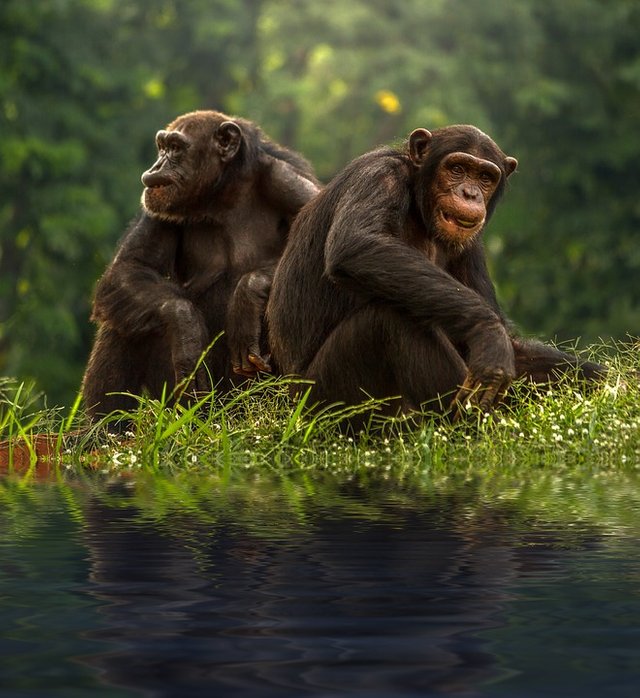How common is monogamy in nature? Why don't we live "partyin' all day long"?

We mammals represent a mere 8.8% of the vertebrates species, with around 5500 known species. If we compare our group with, for example, fish, we are nothing: They represent 50.2%, with more than 31000 species listed.
If we look at the social blueprints all these critters have, including us, we find a humongous diversity. The interesting part is that several of them amaze us or we find bizarre, this is because sometimes we forget that, non-human and human animals are designed from head to toes by EVOLUTION.
There's a branch of biology, Sociobiology, that studies the biologic foundations of social behaviors in animals such as la cooperation, aggression, territoriality and reproductive couple selection. It was very popular as it was born, but it kinda screwed up when it attempted to explain absolutely everything that had something to do with our species by only using biologic bases. Since that moment, many detractors started shooting to kill, comparing it with Social Darwinism and the Eugenics Movement.
The animal world and its social constructs is pestered with situations that are not shown very often in documentaries, that place some unrest in certain people, and that when those situations are a conversation topic during dinner group them under the "Horror Biology" tag. Biology or "low calories Ecologism" do not even mention the group rapes geese perform on ducks and some primates (raping is so common among them, that, females developed a specialized "anti-rape" genitalia); neither do they mention infanticide in lions (I still haven't recovered from the shock of Mufasa's death), some rats and chimpanzees and other primates; or about the induced abortions (known as the Bruce effect) in females of some rodents or Geladas (bleeding-heart monkeys) after the dominant male is substituted by a new one.

Most mammals are solitary, females forage independently (they need no help to feed themselves, feminism at its best!) and meet males only for reproductive purposes. They have some fun, and never meet again (like today's teenagers; but with no child support). A minor number of species are social, the societies can be simple (a couple) or complex (a group). In the case of simple societies they are usually monogamous, a male and a female share a territory for quite a long time. In the group species, the arrangements have several variables.
If a male lives with a female harem (anime fans know what this is) and copulates with all of them (anime fans don't know what this is) we are talking about polygyny. Like in some middle east countries and Africa, but with less rocks thrown to the women. Lions, deer, gorillas and chimpanzees, among others, have this sort of arrangement. One would wonder why the females cope with this sort of contract in which no jealousy or lawyers are involved. In many cases, there's associated benefits, like the cooperative breeding. Also, other examples of advantage of this system is abetter reproductive situation with no need to monopolize the male. She only need his genes and territory (any similarity with some human females is a mere coincidence).

In the other side we have polyandry: a female copulates with several males, acheiving a social organism. Most of the good examples are in the non-mammal groups: some frogs, vultures, snout beetles and fruit flies. Anyways, there's some primates that adopt this social blueprint. The females of the Crab-eating macaque (a monkey that eats crabs, in case it is not clear enough) they screw around with any male they can get a hold of. Generally speaking, they try to mate with the dominant male, but if he play the "I'm so important" card or he's busy... They grab any other (looks like the "good part" of the genes is not the male one there, so they don't really care). The females with higher hierarchic rank are the ones that are ones that are in heat before, the ones that copulate more and the ones with more infants with high survival rates. Under this system it is not the strongest whom prevails, neither the prettier... It is the one with best sperm. Supsperman!!! (???). Translated: The sperm of the males that female was with, play races inside her genitalia.
This process displays that males are as competitive as their seed. The females of the "hamadryas baboon" also adopt this strategy, then the paternity confusion arises, so she aquires several fathers to take care of her infants. So far... I've mentioned nothing new, if we translate it into what we humans do.

What happens with monogamous species?
For a lot of time a postulate was made, that monogamy in mammals was a consequence of the selection of a form of parenting, in which by consolidating a couple the risk of infanticide by other males and females would go down. But during 2013 a work published in the Science magazine literally fucked this lovely theory and, with an extensive analysis that included over 2500 mammal species with available information, it was highlighted that monogamy was because, actually, of the negative reaction females had over the presence of other females when in heat (of course, we humans do not know what this is all about, right?). This intolerance was as important as the territories the occupied, making a male to "settle" for a single lady because... meh, cmon, who wants to walk that much? Monogamy is then usual among somewhat complex species, where females are even MORE complex that cannot stand other females and males are lazy enough to not even go to other territories.
So, humans... Reproductive Matriarchy also exists in some human societies. Several cultures around the globe were studied (the Bari in Venezuela, some Tibetan groups and the Awás in Brazil) where some particular women were found, compared to the worldwide "standards". Males, usually outnumber females in the beginning, but later they suffer a high mortality rate before becoming adults, either because of war, or because they were eaten by a lion or crocodile. Everything aims towards: We do not have a common genetic marker for our social reproductive behavior that tells us "how to" do it, at the moment of getting a couple, on the contrary, we are a very plastic, adaptive, species. We do what is best for our genes, depending on the situation. And this, is also not a human monopoly. If a Chimpanzee couple (originally polygamous), they tend to monogamy ("tend", just as humans do). Everything becomes more competitive when one of those two resources become scarce.

Do not fall into the temptation of abusing fallacies, what is "natural" and what is "right" is most of the time pushing in opposite directions. Infanticide is natural (several species perform it), newborn incubators are artificial... So, if you've a 7 month baby, do not incubate him/her... Dine it!
That, is a topic for another article!

If you liked this post and its informal way of talking about sciences, please, follow me for more!
Leave a comment either for good or for bad reviews. I take everything as constructive, and I really appreciate the feedback, even from trolls (at least a troll read it before being himself!).
Copyrights:
All the previously used images are of my authory or under a CC0 license (Source: pixabay), unless openly stated.
All the Images created by me possess a WTFPL licencing and they are free to redistribute, share, copy, paste, modify, sell, crop, paste, clone in whatever way you want.
This post has been ranked within the top 25 most undervalued posts in the first half of Dec 17. We estimate that this post is undervalued by $13.23 as compared to a scenario in which every voter had an equal say.
See the full rankings and details in The Daily Tribune: Dec 17 - Part I. You can also read about some of our methodology, data analysis and technical details in our initial post.
If you are the author and would prefer not to receive these comments, simply reply "Stop" to this comment.
Downvoting a post can decrease pending rewards and make it less visible. Common reasons:
Submit